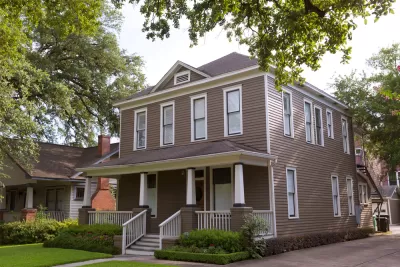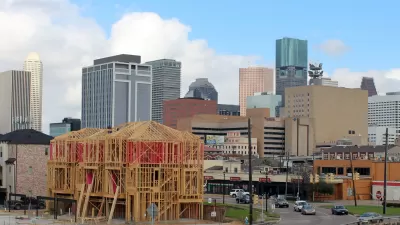In a victory for preservationists, the Texas Supreme Court upheld Houston's Historic Preservation Ordinance despite a lawsuit alleging that the ordinance constitutes illegal zoning rules.

Sara Bronin examines the long-held maxim that Houston, Texas is "zoning’s last frontier," a sprawling metropolis of essentially unregulated land uses, after a consequential ruling by the state's Supreme Court in a lawsuit that challenged Houston's Historic Preservation Ordinance as a form of de facto land use control, equivalent to zoning.
In a lawsuit named Powell v. City of Houston, two homeowners assert that the city's Historic Preservation Ordinance (HPO), “which requires covered property owners to submit plans for significant exterior changes to the city’s Archaeological and Historical Commission," constitutes a violation of "both Houston’s charter (which requires a citywide referendum to green-light zoning) and the state’s zoning enabling act (Chapter 211 of the Texas Local Government Code)."
According to the city, the HPO is not a zoning regulation. In arguing in support of the city's position, Bronin writes that "[z]oning and historic preservation law derive from distinct legal schemes and have different purposes." Unlike zoning, which regulates "uses, structures, and lots in distinctly-regulated districts," historic preservation is much less comprehensive than zoning and "largely protects a subset of built resources – historic resources – and usually applies to just a fraction of land within any particular jurisdiction."
The Texas Supreme Court agreed, ruling in June that "the ordinance does not implement zoning as that concept is originally understood, and therefore the City Charter’s limits on zoning do not apply," as the HPO "did not come close to citywide applicability, it did not subject regulated property to uniform standards, and it did not implicate uses."
The Court's decision "was a definitive victory for historic preservation, for the City, and for all Houston property owners who opted in to the HPO," letting "the city of no zoning" regulate land use in, at least, a piecemeal way.
FULL STORY: Houston: Still Zoning’s Last Frontier?

Alabama: Trump Terminates Settlements for Black Communities Harmed By Raw Sewage
Trump deemed the landmark civil rights agreement “illegal DEI and environmental justice policy.”

Planetizen Federal Action Tracker
A weekly monitor of how Trump’s orders and actions are impacting planners and planning in America.

Why Should We Subsidize Public Transportation?
Many public transit agencies face financial stress due to rising costs, declining fare revenue, and declining subsidies. Transit advocates must provide a strong business case for increasing public transit funding.

Understanding Road Diets
An explainer from Momentum highlights the advantages of reducing vehicle lanes in favor of more bike, transit, and pedestrian infrastructure.

New California Law Regulates Warehouse Pollution
A new law tightens building and emissions regulations for large distribution warehouses to mitigate air pollution and traffic in surrounding communities.

Phoenix Announces Opening Date for Light Rail Extension
The South Central extension will connect South Phoenix to downtown and other major hubs starting on June 7.
Urban Design for Planners 1: Software Tools
This six-course series explores essential urban design concepts using open source software and equips planners with the tools they need to participate fully in the urban design process.
Planning for Universal Design
Learn the tools for implementing Universal Design in planning regulations.
Caltrans
Smith Gee Studio
Institute for Housing and Urban Development Studies (IHS)
City of Grandview
Harvard GSD Executive Education
Toledo-Lucas County Plan Commissions
Salt Lake City
NYU Wagner Graduate School of Public Service




























